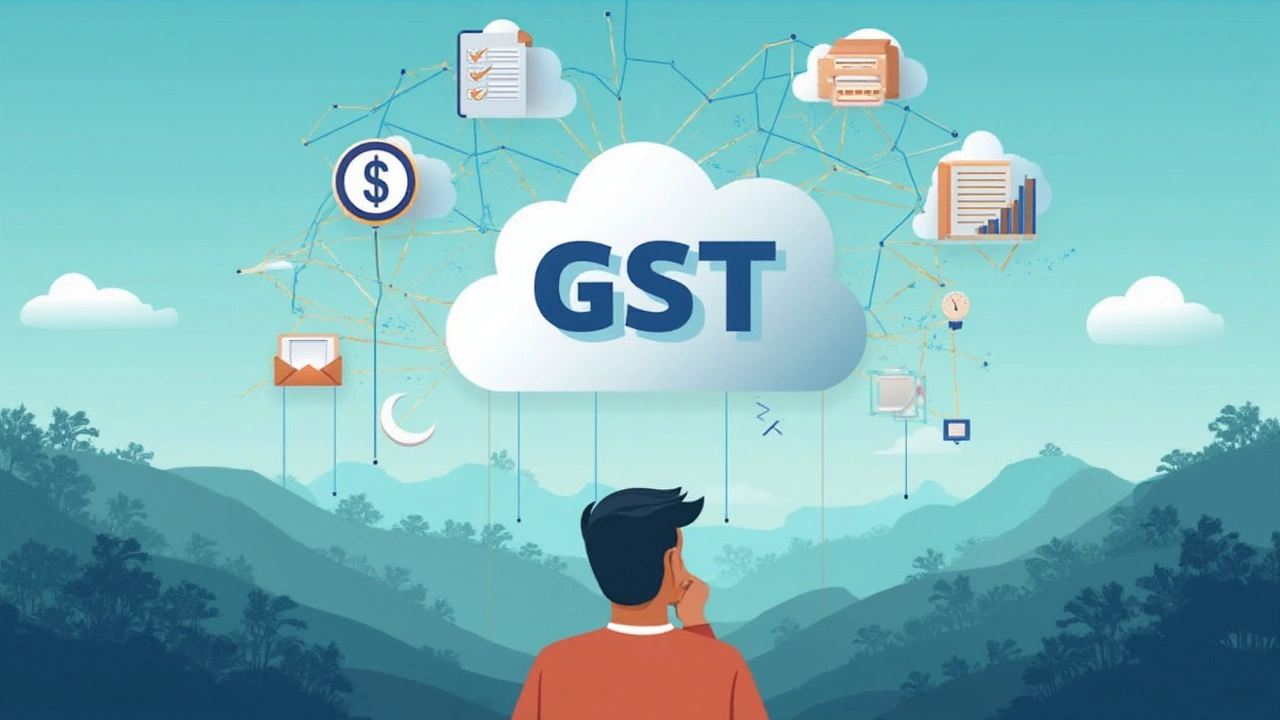
GST returns are like your tax report cards. They let the government know about the sales, purchases, and taxes you've collected and paid. It's super important to get it right to ensure you're on the right side of the law and avoid any unpleasant fines.
So, how often do you need to file a GST return? That depends on who you are and what your business does. Most businesses file their GST returns monthly, but there are different rules for different types of taxpayers. For example, small businesses might have quarterly filings, which can be a bit of a relief when you’re managing limited resources.
Depending on your particular situation, you may find yourself in a special category. For those in a specific industry or those using the Composition Rule, filing frequencies and forms may change. It's essential to dig into the specifics that apply to you.
- Understanding GST Returns
- Filing Frequency for Businesses
- Special Cases
- Common Pitfalls
- Practical Tips
- Staying Ahead
Understanding GST Returns
Alright, let's break it down. GST return is basically a document that taxpayers need to file with the tax authorities. It includes details about the sales, the tax you've collected, and the purchases on which you've paid tax. Filing these returns is how businesses keep their tax affairs in order.
Every registered business must file the right GST returns for their category. Generally, the usual suspects for filing are the GSTR-1, covering sales and outward supplies, and GSTR-3B, a monthly summary return. You must be thinking of this as just paperwork, but it keeps you on the right side of the law and helps avoid any unwanted fines.
"Timely filing of GST returns is crucial for a smooth business operation and maintaining compliance with tax regulations." - Indian Tax Authority
Let's talk about the nitty-gritty a bit more. The frequency of these filings depends on your business type and turnover. Regular businesses need to file both GSTR-1 and GSTR-3B monthly, but smaller businesses can opt for quarterly filings under the QRMP scheme if their turnover is up to Rs. 5 crore.
GST returns might sound like a lot of hassle, but think of them as the business version of making sure you've double-checked the fridge for snacks before starting a movie. When they're sorted, everything else just flows.
Here's a little something many miss: the late fees can be painful. Not filing on time could attract a Rs. 50 per day fee for GSTR-3B, so keep those deadlines in mind!
To make things bite-sized, here's a quick list of things you'll need for filing:
- Sales invoices
- Purchase invoices
- Receipts of advance payments
- Credit/Debit notes
Getting your documentation in place beforehand is gold. Imagine a well-organized drawer; everything's easier to find when you need it. So, don't just wing it, keep your records tight, and your filings won't be a chore.
Filing Frequency for Businesses
Alright, let's talk nitty-gritty about how often businesses need to file those pesky GST returns. If you run a regular business in India, you're likely filing your GST returns monthly. Yep, it's a bit of a commitment, but it's crucial for staying compliant and keeping things running smoothly.
Now, here's where it gets interesting: if your annual turnover is less than ₹5 crore, you might qualify for a simple quarterly filing called the 'QRMP scheme.' It stands for Quarterly Return Monthly Payment, which lets you file returns every quarter while making tax payments monthly. It's like having the best of both worlds!
For businesses using the Composition Scheme, things are even more relaxed. You'll only need to file returns annually, but there's a catch—you have to file quarterly statements for tax payments. This scheme is generally for small businesses with a turnover of up to ₹1.5 crore, aimed at reducing compliance costs.
Ready for some numbers? Check out this snapshot of GST filing frequencies:
| Business Type | Turnover | Filing Frequency |
|---|---|---|
| Regular Business | Above ₹5 crore | Monthly |
| Regular Business (QRMP) | Up to ₹5 crore | Quarterly |
| Composition Scheme | Up to ₹1.5 crore | Annually + Quarterly Tax Payment |
You definitely don't want to miss these deadlines. Not only can delays cost you financial penalties, but it's also a total headache to deal with the paperwork afterward.
A tip? Keep a digital calendar with alerts for each deadline. Trust me, it can really save your bacon!
Special Cases
Alright, let’s talk about those special cases where the usual GST rules hit a few curveballs. If you're a small business, especially in India, you might qualify for GST Composition Scheme. Here's why it's a sweet deal: lower tax rates and quarterly filings instead of monthly madness. You file a simpler return called GSTR-4, and it's specifically designed for businesses with a turnover up to a certain limit. Makes life so much easier, right?
Now, what if you're dealing in goods that are exported or imported frequently? Here, the GST deadlines can vary, and you might have to dive into additional forms like GSTR-5 if you're a non-resident taxable person. This sounds fancy, but it's just someone supplying goods or services in India without a permanent business base here.
Another special case pops up when you deal with e-commerce platforms. Businesses selling through online marketplaces need to regularly file GSTR-1 and GSTR-3B and reconcile their sales with the e-commerce operator’s records.
And here's a unique tidbit: some service industries don’t have to do monthly filings. For example, those involved in providing services to the central or state government may benefit from specific exemptions, not just from filing frequency but also from GST itself.
To wrap this up, make sure you know where you stand in the GST landscape. It's all about compliance, and if you fall into these special categories, keeping track of your GST filings and staying in the know can lift a massive burden off your shoulders.

Common Pitfalls
Filing GST returns can sometimes feel like navigating a maze, and it's easy to trip up if you're not careful. Here are some common mistakes folks often make when handling their GST returns. Knowing these pitfalls can help you steer clear and make the whole process a bit less stressful.
First up, missing deadlines is a big one. With different deadlines for monthly, quarterly, or other special filings, it's understandable to mix them up. But beware, missing these deadlines can lead to penalties or interest charges. It's a good idea to mark those dates on your calendar or set reminders on your phone. Staying ahead of those deadlines keeps you in the safe zone.
Another area where people often falter is accuracy. Filling out the wrong numbers, whether it’s sales, purchases, or taxes collected, can lead to a mess. Always double-check your numbers or have someone else review them. Small errors can snowball and create big issues down the road.
Also, failing to reconcile your returns with your financial statements can cause trouble. It's essential to ensure what you're reporting is in line with your actual business transactions. Keeping organized records is key here.
Data entry mistakes are another headache. If your accounting software isn't set up just right, misclassification can occur. Make sure your system is updated and properly synced with GST requirements.
And watch out for incorrect ITC (Input Tax Credit) claims. Claiming credits you’re not entitled to can lead to audits and penalties. It's crucial to understand what you can and cannot claim to stay compliant and avoid any nasty surprises.
Here's a quick tip: consider maintaining a simple checklist or process document customized for your business. It can save a lot of hassle by ensuring every step is followed consistently each time you file.
Practical Tips
Filing your GST return doesn't have to be a last-minute headache. With a few smart moves, you can keep the process smooth. Here’s what works:
- Stay Organized: Keep all your invoices and receipts sorted and filed. Digital tools can be a lifesaver here, making it easy to track and store vital documents.
- Set Reminders: Missing deadlines can lead to penalties. Use calendar apps or alerts to remind you when it's time to file your returns, especially if you’re doing it monthly.
- Use Reliable Software: Invest in a good accounting software that automates a lot of the filing process, reducing errors and saving time. Look for features that sync your data directly with GST portals.
- Know Your Category: Different businesses have different filing requirements. Ensure you're aware of the specifics for your category, whether it's monthly or quarterly.
- Consult a Professional: If all else fails, or if things get too complex, don't hesitate to get help from a GST consultant. They can offer guidance tailored to your situation.
Here's a quick peek at some interesting data on GST filings:
| Entity Type | Filing Frequency |
|---|---|
| Regular Business | Monthly |
| Composition Dealers | Quarterly |
By following these tips, you can make the GST return filing process less of a burden and keep your business running smoothly. Always being prepared is key to staying ahead!
Staying Ahead
Keeping up with GST return filing schedules doesn’t just save you from late fees; it also positions your business for growth. But how do you stay ahead of the game and make filing a breeze? Follow these steps to keep your business running smoothly.
First things first, set reminders. It sounds simple, but calendar alerts can save the day. Most businesses need to file monthly, so setting a recurring reminder for the deadline ensures it never sneaks up on you.
Next, keep your records organized. Having a dedicated place for all invoices and receipts means no last-minute scrambles looking for that one elusive document. Consider using accounting software that integrates with GST filing systems, which can automate updates and streamline the process.
Here's a pro tip: regularly update your transactions. Set aside a time each week to go over your sales and purchases. This makes the end-of-month tasks less daunting and your data more accurate.
Another helpful idea is seeking help from a professional if it feels overwhelming. Many businesses hire a tax consultant or use GST compliance software to ease the process, ensuring they're always compliant and up-to-date with recent changes in tax laws.
Finally, it’s smart to review the GST deadlines annually, especially with any changes in tax regulations that might affect your filing frequency. Keeping updated with tax news or newsletters can give your business an edge in compliance.
With these steps, filing your GST returns becomes less of a burden and more of an integrated part of your business routine. It’s all about finding what fits best for your business style and sticking with it!





Write a comment